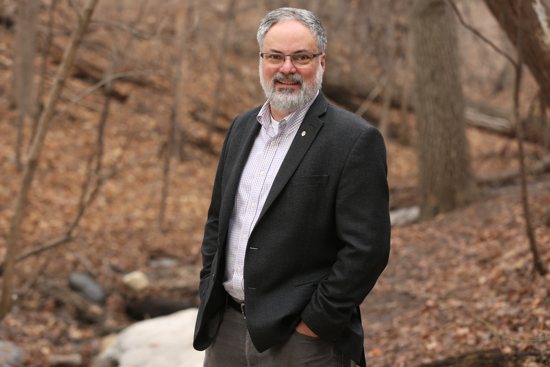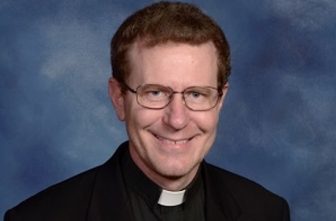
Concerned about a modern-day weakening of care for the natural world and what he saw as a lack of understanding and development of Catholic thought that has long demanded respect for God’s creation, moral theologian Christopher Thompson sat down to write three years ago.
What emerged is titled “The Joyful Mystery: Field Notes Toward a Green Thomism.”
Accessible, humorous, insightful and inspiring, the book suggests that St. Thomas Aquinas’ understanding of man as an embodied spiritual and intellectual being who stewards God’s creation can help ground people in reality, and inspire more love and concern for the world around them.
Such an understanding, Thompson argues, can lead to wise use of the earth’s resources and prudence in the face of powerful technology such as CRISPR, which can manipulate DNA to change the very structure of animals, insects and plants.
Published two years after Pope Francis’ 2015 encyclical “Laudato Si’, On Care for Our Common Home,” Thompson’s book integrates the pope’s teaching on faith, ecology and the environment with Thompson’s more than 10 years of research on the subject and what he calls “Green Thomism”: using St. Thomas’ theology on creation to help guide ecological decisions.
A professor at the St. Paul Seminary School of Divinity at the University of St. Thomas and a parishioner of Nativity of Our Lord, both in St. Paul, Thompson spoke with The Catholic Spirit March 29 about his book, his own connection to nature, and his hope for the future.
The Q&A has been edited for length and clarity.
Q. Why did you feel it was important to write “The Joyful Mystery?”
A. (Under modern thinking) the human person stands over and against creation as master and commander — and with the new technologies and the CRISPR technologies that’s going to be increasingly true. We’re going to have to, as a Church, be prepared to guide that conversation. … In the absence of that offering, something else will fill the void.
Q. You have talked about developing an understanding of mankind’s spiritual relationship with lower animals, insects and plants as going into “uncharted waters.” Why are they uncharted and why the urgency to chart those waters now?
A. Well, you know, stepping back more broadly, in my opinion the Church was late to the table on ecological conversations … . The Church, I think, in her imagination, in her language, and in her theology was largely an urban phenomenon. The idea of the rural life or the idea of wilderness spaces was just an ancillary concern. The theology was there, we had a theology of creation. It’s not about the doctrinal elements, but it’s about where the Church’s energies were directed.
Q. Why is it that we’re in this place where we don’t have the respect and awe of nature and the responsibilities that follow?
A. I can think of at least two factors.
One was the jettisoning of Christianity as the normative narrative of the West, (with) a theology of creation, sin and redemption, coupled with an incredible burst in technology and economic development that made it almost irresistible. And so you and I are going to have to be called for a heroic witness. It’s going to require heroic witness on our part to resist the impulses to just run roughshod over the natural order.
Q. What do you see as some of your book’s major themes?
A. In my more optimistic moments, it’s really about inviting the reader to be much more docile to the way the Lord wishes to enter into our lives. Yes, it’s through sacred Scripture; yes, it’s through the sacraments of the Church; but we have to remember that the Christ we profess is the Logos of creation, that is, the one through whom all things came to be. In other words, Christ is the Incarnate Word. But it’s not the word of Zeus, it’s not the word of Mazda. It’s the Incarnate Word of the provident God of Genesis. So no Christian, it seems to me, can be indifferent to creation. Because we’re not indifferent to Christ, the Logos of creation.
Q. And pessimistically?
A. It’s all that apocalyptic language about meeting challenges, overcoming modernity, etc. But we have the Holy Spirit. We have Christ, and it’s going to be fine. …
Another central theme I think would be that the New Evangelization will run out of steam unless it embraces the “stuff” of our lives. Culture is the intersection of spirit and matter, and that’s man’s privileged position. … If I had a concern, it’s that Catholicism is becoming an increasingly elaborate mental landscape of characters and figures and dramas lived almost exclusively between the ears. I just think that this is not our faith. …
You have to be able to go outside and say, “When all is said and done, I see a beautiful sunset.” … I think the encounter with beauty is a first step in the discovery of Christ. … All of a sudden, you tread more lightly. In other words, ecology is not at odds with the Christian faith, ecology is the expression of the Christian faith. The best definition it seems to me of ecology is the Holy Spirit-filled participation in the ordered cosmos.
Q. What is your personal connection with nature?
A. We (Thompson and his wife, Mary) have a native prairie that we maintain out in Wisconsin. And that was a huge discovery that taught me so much. … It was all corn. There was nothing there, just corn. And when you first went out there, there was not a bug, there was not a bird, there was not a worm in this field because of course it had been (chemically) treated for years and you would have thought you were indoors. … We took the corn out. Then we started to develop the native prairie and now there’s thousands of flowers and bugs and birds and bees.
Q. How else have you come to know nature and live differently than you once did?
A. “I just simply eat less meat, eat beans and rice, lots and lots of various forms of food that are lower on the food chain. For one, I think it just puts you in solidarity with the rest of the world. And it makes you appreciate fine meat when you have the chance to enjoy it. …
That’s what I was trying to say earlier about Catholicism and the sort of menagerie between the ears. You and I go to Mass on Sunday and we profess a certain world view. But then Monday through Friday we live in a completely different world. And then we wonder why the faith isn’t alive in my life. Well, some of it is because when you’re going back home you’re simply going back into the world of unbridled consumption. And it’s very attractive, and it’s very alluring, but it’s not our Catholic faith.
Q. Why do you think increased attention to ecology has come up now?
A. Maybe, in some ways, the West is spent. We’ve sort of run out of gas. The Soviet Union has collapsed. We have this great economy. We have this great realm of possibility. We’re sort of all dressed up and not sure where to go. And the … chaos in the political sphere is sort of indicative of the lost character of things. We’re not quite sure what to do with our newfound authority and our newfound capacity. And so people in their heart of hearts begin to see that a life of unbridled consumption just simply isn’t that satisfying. And constantly measuring the success of your country based on the expansiveness of the GDP is going to be a zero-sum game. … We’re going to have to find someone to help lead us out of the certain shackles that come with unbridled capitalism. …
I see the climate change discussions as a great test of the grand narratives, that is the climate change discussions at this point seem to think the way forward is increasing bureaucratic machinations. Well, I think in our heart of hearts we know that’s going to be a dismal failure. The only way we’re going to be able to confront climate change is a kind of conversion of heart. A kind of infusion of the Holy Spirit. It’s going to have to come out of a conviction about the nature of Christ and his Church, and not about strategic policy from remote bureaucrats.
Q. What is your hope for our society finding its way to Christ, and then to a more integrated lifestyle?
A. I work in the seminary. So my hope is real and true. … Ultimately, you have to remember, we’re Catholics, we’re Christians. So the battle is won. Now it’s just skirmishes. … Ultimately the battle is won in Christ.
Q. You mentioned hard times.
A. Wouldn’t it be fun to raise a generation of Catholics who were just more spontaneously modest in their habits of consumption? Doesn’t every parent ultimately long for children who are in love with life and not stuff? Doesn’t every parent long to raise a child who is full of promise and possibility and not peril? To raise a child who is confident that the grace of Christ enables us to meet the challenges, and begins to see in their relationship with Jesus the sort of 24/7 relationship that it’s not just a Sunday morning thing but a Monday morning thing? That they start to develop habits of using their talents for others, and to start to develop the acquisition of goods that come with the success of those talents as always ordered to the other, as opposed to the endless empire building, the endless accumulation of wealth that can be so attractive and so alluring?
Ultimately, I think every person really wants that. Our job as Catholics is to give witness to that, and I think just simply embracing the movement of ecology is a way of facilitating that.
So that when you go outside, you’re going inside. … You’re going into the Father’s house, and you stay in conversation with God no matter where you are.




